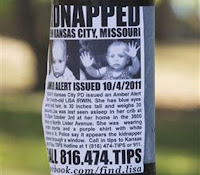It’s a high stakes, middle of the night gambit that has little chance for success. You can silently and carefully observe the house and its residents all you want. You can become familiar with patterns, but a house full of kids can never be totally predictable. Flashlights are to be avoided as much as possible so your eyes can become accustomed to the dark, lest you step on toys and sleeping pets. Forget about windows and fences, even a gymnast would have trouble conquering those obstacles with a child in tow. And even the fingers of a skilled locksmith cannot control the volume of the tumblers as they succumb to his practiced touch, nor the distinctive click of the door as the perp and his prey disappear into the darkness.
It’s a scenario that has supposedly played out far too often lately. 11-month-old Lisa Irwin wasn’t in her crib on the morning of October 4, 2011 so her mother called the Kansas City, Missouri 911 emergency line. A few months later, on December 17 in Waterville, Maine 2-year-old baby Ayla Reynolds father called 911 to report that she had been kidnapped from her bedroom the night before. 6-year-old Isabel Celis father reported his daughter missing from her Tucson, Arizona home at 8:00 a.m. on April 21, 2012. Finally, 6-year-old Sierra Newbold’s mother made an emergency call at about 7:30 a.m., on June 26, to report that her daughter was missing from her bedroom.
Unfortunately, I’m all too familiar with the pattern. In 1993 my Polly was snatched from her bedroom. Because there were witnesses and because of a dogged investigation Polly’s killer now sits on California’s death row. Almost a decade later, on June 5, 2002 14-year-old Elizabeth Smart was kidnapped from her Salt Lake City, UT bedroom. Miraculously, 9-months later Elizabeth was recovered alive not 20-miles from her home. Her kidnappers are now serving life sentences behind bars.
In both of these cases family members who were initially under intense scrutiny were quickly removed from the list of possible suspects because we truly cooperated with the authorities. Polygraph exams were administered, multiple interrogations were conducted and witnesses were questioned.
With the exception of Sierra Newbold, whose broken and abused body was found discarded in a ditch near her home shortly after her mother called 911; the other children have not been located. Some believe that the girls have been sold into sexual slavery. However, when 1.6-2.8 million runaway children live on the mean streets of America on a given day, and are easily found in medium to large cities throughout the United States, why would traffickers risk everything to steal an infant in the dead of night?
Others speculate that the children are victims of revenge, or that their disappearances are payback for drug debts. While revenge kidnappings do occur, they are much more common as plot devices in action novels than in real life. As drug cartels ramp up levels of violence, including kidnappings for drug debt, there has not been a ransom demand in any of the cases cited above.
Closer to home rumors circulate that “bad” uncles are responsible for the girl’s disappearance. Unfortunately, predators do not exist in a vacuum. They have relatives and families. Predatory relatives can go undetected for decades or even avoid detection altogether. I know of many families that have been victimized by one of their own. However, these men tend to commit crimes of convenience. They wait until they are alone with the victim, when they think that they can avoid detection, and then they strike; oftentimes with lethal violence. They don’t sneak into the house in the middle of the night – because they don’t have to.
Typically, the parents of kidnapped children would move heaven and earth to recover their kids. That is what the Klaas and Smart families did. We worked with law enforcement; we pestered the media and embraced our local communities. But, more than anything else, we never gave up hope. Instead, we did something every day that would move the case forward. Some might say that we were annoying.
However, baby Lisa’s parents lack of cooperation with the Police is almost as well documented than the disappearance of their daughter. According to the Police the three adults that were in the house the night that baby Ayla vanished have not been forthcoming with details of her disappearance. In Tucson, Child Protection Services ordered Isabel Celis father to move out of the house that he shared with his family and cease all contact with his other children. It is still too early in the game to judge Sierra Newbold’s case. Hopefully, it will not linger without resolution as have the others.
I have no idea if these parents are involved in their children’s disappearance. What I do know is that one of the most challenging and difficult scenario imaginable is being replicated far too often throughout the country. That these cases remain open must also strike fear in the hearts of neighbors and friends. If such brazen criminals are freely roaming our neighborhoods and the authorities are unable to solve the cases, then all children remain at risk.
If you are concerned that your children may not be safe in your home I offer the following suggestions. Lock your doors and windows at night. Purchase surveillance equipment from a home security specialist. Get a big, loud dog that is easily disturbed during the night. Know where your young children are at all times and don’t leave them by themselves. Work with your neighbors to create an effective neighborhood watch program so that you can work together to protect each other’s children and property. Know your neighborhood. Show your children the safe places to play and areas to avoid like dark stairwells and alleys. The more you know about your neighborhood the safer your family will be.




















